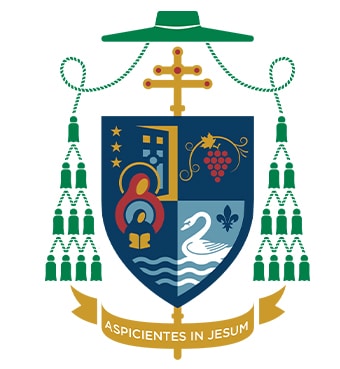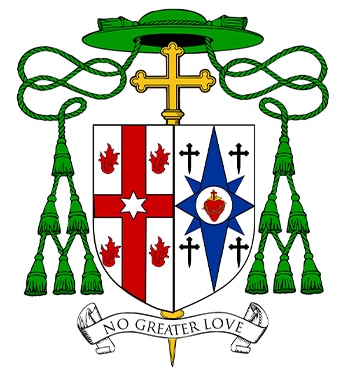The Decline of Objective Moral Truth

The contemporary Church suffers from the same strange malady that is afflicting all of contemporary society: the denial of objective moral truth. There is also an almost Promethean trust in the human intellect to discover all truth and a simultaneous denial that objective truth exists. This denial of objective truth affects the secular world, but in the Church now this is especially the case with moral truth.
In 1993, Pope St. John Paul II warned against this danger in Veritatis Splendor (VS, “The Splendor of Truth”), when he wrote:
“Today, however, it seems necessary to reflect on the whole of the Church’s moral teaching, with the precise goal of recalling certain fundamental truths of Catholic doctrine which, in the present circumstances, risk being distorted or denied. … It is no longer a matter of limited and occasional dissent, but of an overall and systematic calling into question of traditional moral doctrine, on the basis of certain anthropological and ethical presuppositions. At the root of these presuppositions is the more or less obvious influence of currents of thought which end by detaching human freedom from its essential and constitutive relationship to truth” (4).
The late pontiff was here reflecting on a current within the Church itself, which in turn reflects a larger current in philosophical circles in general: The traditional definition of truth — the fact that the idea in the mind must reflect the thing outside the mind — has been called into question. As a result of thinkers like Immanuel Kant (1724-1804), truth has now become subordinate to whatever the mind makes of it. Human need creates truth.
John Paul II criticized such a view for leading humans to think that morals were a mere reflection of the exalted conscience so that our freedom creates truth — rather than the other way around. He stated that there were similar tendencies in Catholic thought that sought to deny the very idea that moral truth depended on an objective human nature, stating that “… these tendencies are at one in lessening or even denying the dependence of freedom on truth” (VS, 34).
In another of John Paul II’s landmark encyclicals, Fides et Ratio, he calls for a rediscovery of a correct understanding of truth. Such a renewal involves a return to what the Scholastic theologians in the Middle Ages called “the correspondence of the mind to the thing” (82). To that end he quotes the Second Vatican Council document Gaudium et Spes:
“Intelligence is not confined to observable data alone. It can with genuine certitude attain to reality itself as knowable, though in consequence of sin that certitude is partially obscured and weakened” (15).
This assertion stands in direct opposition to contemporary man’s tendency to shy away from questions about truth — even as he thinks that his needs or feelings can change the truth.
C.S. Lewis observes this same tendency in The Screwtape Letters, when he has a senior tempter in hell explain to a junior tempter on earth the modern situation:
“Your man has been accustomed ever since he was a boy to having a dozen incompatible philosophies dancing about together in his head. He doesn’t think of doctrines as primarily ‘true’ or ‘false,’ but as ‘academic’ or ‘practical,’ ‘outworn’ or ‘contemporary.’ … Jargon, not argument, is your best ally in keeping him from the Church.”
The sad thing is that if a person’s needs create truth, then the individual becomes the source of whatever is true. In general that means that even God has to prove his existence. As a result, objective morality loses any value for the individual and the individual conscience becomes an oracle that creates its own moral truth.
This contemporary attitude is also reflected in Lewis’ writings. In God in the Dock, he expresses his concern that modern man no longer recognizes objective truth, but only the mind’s subjectivity regarding the existence of God and the divine law.
In the book, Lewis uses the courtroom analogy whereby a judge and an accused person attempt to put God on trial. (In an English courtroom, the accused stands in the “dock,” the English word for the witness stand.)
“The ancient man approached God (or even the gods),” Lewis writes, “as the accused person approaches his judge. For the modern man the roles are reversed. He is the judge; God is in the dock. … The trial may even end in God’s acquittal. But the important thing is that Man is on the Bench and God is in the Dock.”
This attempt to recreate truth, even when it comes to the law of God, is very difficult indeed when it subjects God and his law to contemporary interpretations of social problems, such as the crisis in marriage and the family. Church leaders may try to reject Christ’s teaching in the Gospels that marriage cannot be dissolved by divorce — and they may further confuse the issue by suggesting that divorced-and-remarried persons can still receive Communion.
According to Church teaching, the problem with divorced-and-remarried persons receiving Communion stems from the fact that the former marriage cannot be proven invalid until the divorced person submits evidence to the diocesan marriage tribunal.
In the meantime, the parties involved completely ignore the objective truth of the case: The divorced individual is having sexual relations with someone to whom, in the eyes of the God, he or she is not married. By sidestepping the truth of the matter, simple logic would lead one to conclude that there are few if any moral obstacles that can prevent an individual from receiving Communion in today’s Church.
As another example of this disregard for the objective truth, Church authorities changed the wording in the Catechism to reflect a change in teaching on capital punishment. Before this change, the Church taught that capital punishment should be “rarely if ever” considered a just form of punishment. Currently, the Catechism says that “‘the death penalty is inadmissible because it is an attack on the inviolability and dignity of the person,’ and she works with determination for its abolition worldwide” (2267).
Curiously, although this change was justified by the claim that the Church has a more developed understanding of the human person, the definition of murder was not changed.
“No one can claim under any circumstance for himself the right directly to destroy an innocent human person,” the Catechism states (2258). This text comes from a 1987 instruction, Donum Vitae, taught by the Congregation for the Doctrine of the Faith, whereas the new wording on capital punishment merely comes from a papal address. These statements contradict each other. One affirms that murder involves the death of an innocent person entailing the logical conclusion that the killing of a person guilty of capital murder does not constitute the violation of the Fifth Commandment. Yet there is really no attempt so far to resolve the contradiction. In addition, there is no real attempt to clarify how “inadmissible” relates to “objectively sinful.” One wishes some definition which is clearer, for example that it is a mortal sin.
As these two examples indicate, the present confusion in the Church can be attributed to understanding the truth as objective. This malaise is more broadly reflected in the Church among those who seek to fly from creeds and doctrines which express a clarity in thought.
For instance, one seminary sent its students out to help in a parish’s religious-education program. These seminarians were specifically told not to teach the children in the program doctrine the seminary termed “boring”; rather, they were encouraged to make their young students feel happy to be there.
Given this lack of ability to address the issue of objective truth, it is no wonder that confusion currently reigns supreme in the Church. A rejection of true philosophy and a knowledge which affirms objective truth cannot help but result in looking on freedom and love as things we create for ourselves rather than as gifts we receive from God.
In a sense, the issue that faces the Church is not a confusion in morality, but a failure to educate the faithful about the truth.
Canon 217 states:
“Since they are called by baptism to lead a life in keeping with the teaching of the Gospel, the Christian faithful have the right to a Christian education by which they are to be instructed properly to strive for maturity of the human person and at the same time to know and live the mystery of salvation.”
This right can only be fulfilled when all Catholic teachers, especially those in authority, have a correct understanding of the necessity and nature of objective truth.








